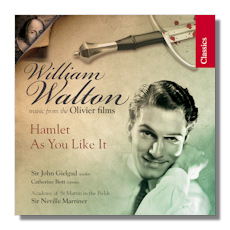
The Internet's Premier Classical Music Source
Related Links
- Walton Reviews
- Latest Reviews
- More Reviews
-
By Composer
-
Collections
DVD & Blu-ray
Books
Concert Reviews
Articles/Interviews
Software
Audio
Search Amazon
Recommended Links
Site News
 CD Review
CD Review
William Walton

Music from the Olivier Films
Arranged by Christopher Palmer
- Hamlet: A Shakespeare Scenario *
- As You Like It: A Poem for Orchestra after Shakespeare **
* Sir John Gielgud, speaker
** Catherine Bott, soprano
Academy of St. Martin-in-the-Fields/Sir Neville Marriner
Chandos CHAN10436X 51:58
Summary for the Busy Executive: One of the two most complete recordings of Walton's Hamlet to date.
As one of the bright young lights of British music between the wars, William Walton was tapped by film producers to score movies in the early Thirties. He started out scoring some routine pictures, with (for him) some fairly routine scores. The liner notes, for example, excerpt Britten's snarky review of As You Like It (1936). However, despite the presence of Olivier as Orlando, this is one crummy picture. Elisabeth Bergner as Rosalind had an unconvincing bout with Shakespearean English. The sets would have shamed a high-school production, and the director – Bergner's husband, Paul Czinner – had very little idea what to do with a camera. The movie deserved no more than what Walton gave it – a pretty and essentially decorative score – and I doubt any music could have saved this project. Walton's great film scores appear in the Forties, especially the three Shakespeare collaborations with Olivier: Henry V, Hamlet and Richard III.
Nevertheless, As You Like It does contain some great moments, particularly Walton's setting of "Under the Greenwood Tree," one of his most beautiful songs. It's unusual in that as a piece of "period" music, it's far more modal and folk-like than Walton usually gets, even in his "Tudor" moods.
After the confection of As You Like It, the score of Hamlet practically bludgeons you. The violence of the score, like that of the play, is mostly interior. Olivier wanted a "psychological/Freudian" Hamlet, and Walton obliged by coming up with a score that boiled with repressed inner battles. One should point out that by this time, Walton had learned from Prokofiev's Nevsky how to give symphonic sweep to film music and to integrate more completely music with dramatic action. The "Funeral March," for many years the only excerpt of this score available, indicates some of this. However, this CD reveals a lot of great music that I doubt anybody but scholars and specialists have heard until recently.
For me, the "Mousetrap" sequence – where Claudius reveals himself to Hamlet as the old king's murderer – stands out, not only in the film but on its own. The musical action, like the scene, happens on two planes: the view of the unsuspecting court watching an entertainment and Claudius's guilty knowledge triggered by the play. The players get Walton's version of Tudor music, Claudius something more modern and "psychological." Claudius's music kicks in when the camera focuses on him; otherwise, we get the players' dumb-show. The brilliance of Walton's contribution lies in the fit between the two. We don't "wipe" from one to the other but get taken in a clean jump, reflecting the way Olivier's camera moves. Furthermore, we cross from one to the other without a jar. The two strains lock together perfectly, like "the click on the lid of a well-made box."
I question Palmer's penchant (he's done this in all of his arrangements of Walton's Olivier Shakespeare music) for melodrama – a speaker over a musical background. So here we get Gielgud reciting "O that this too too sullied flesh" and of course "To be, or not to be." Melodrama on stage (though not in film) has almost always seemed superfluous to me: either the music isn't all that interesting (in which case, why have it?) or that it's more interesting than the words (in which case, why distract from the play?). Walton's treatment of the first is a slow fugue, which elevates the musical interest considerably. I'd prefer to hear it without Gielgud's recitation.
Because almost none of this music has appeared in recording, Marriner has the field pretty much to himself. I certainly recommend it over Andrew Penny's account on Naxos – okay, but not particularly exciting. Indeed, Marriner does a marvelous job. He conducts the funeral march a bit less deliberately than the composer's super-Expressionist reading on EMI (not currently available), but the piece has almost an excess of tension. You don't really need constant pressure to make it work. No problems with Chandos's sound, of course. The company has also released the Henry V music. For those interested in film music generally and in Walton particularly, these are three essential CDs.
Copyright © 2009, Steve Schwartz



















